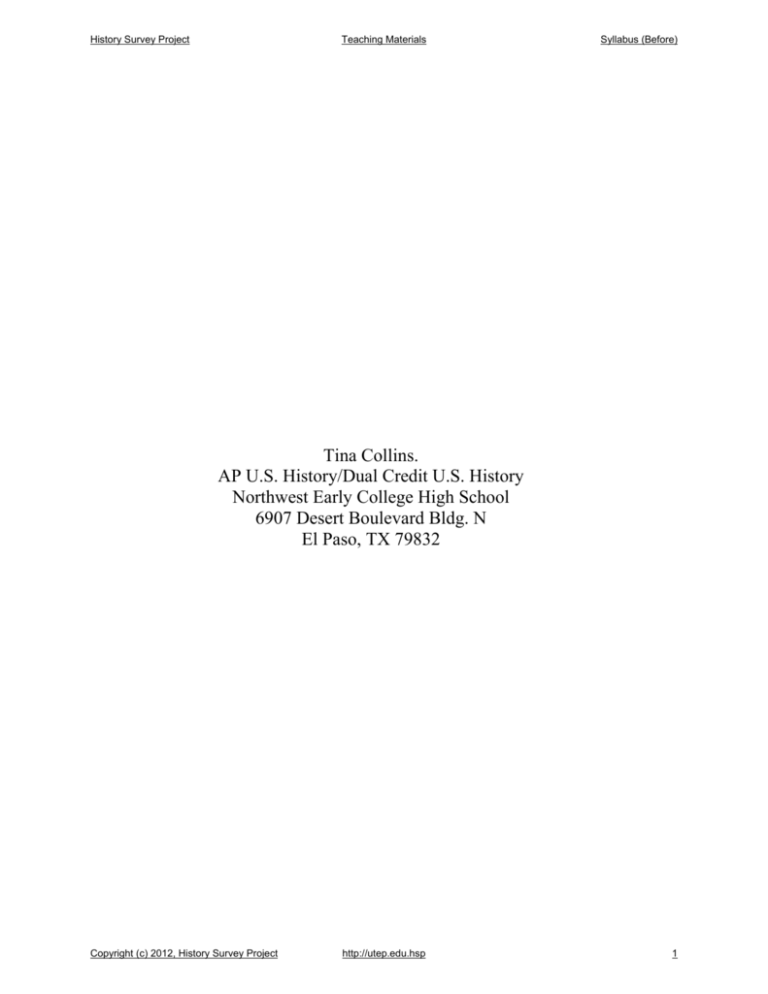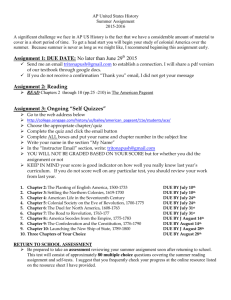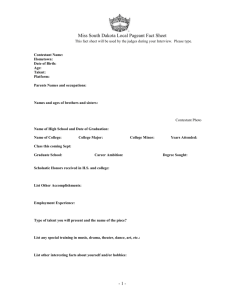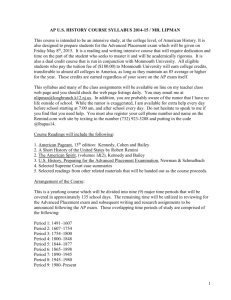
History Survey Project
Teaching Materials
Syllabus (Before)
Tina Collins.
AP U.S. History/Dual Credit U.S. History
Northwest Early College High School
6907 Desert Boulevard Bldg. N
El Paso, TX 79832
Copyright (c) 2012, History Survey Project
http://utep.edu.hsp
1
History Survey Project
Teaching Materials
Syllabus (Before)
Advanced Placement U.S. History Syllabus
Course Description
Advanced Placement (AP) U.S. History is a challenging course that is meant to be the
equivalent of a freshman college course and can earn students college credit. It is a twosemester survey of American history from the age of exploration and discovery to the
present. Solid reading and writing skills, along with a willingness to devote considerable
time to homework and study/ are necessary to succeed. In addition to exposing students to
historical content/ an AP course also trains students to analyze and interpret primary sources/
including documentary material/ maps/ statistical tables/ and pictorial and graphic evidence
of historical events. Students also learn to take notes from printed materials/ lectures/ and
discussions. They learn to express themselves with clarity and precision. The course is also
intended to prepare students to take the AP U.S. History Examination. High school juniors
are able to enroll in AP U.S. History. The school district has open enrollment and
encourages all qualified students to take AP U.S. History.
Course Objectives
Students will:
• Master a broad body of historical knowledge
• Demonstrate an understanding of historical chronology
• Use historical data to support an argument or position
• Interpret and apply data from original documents/ including cartoons/ graphs/ letters/ etc.
• Effectively use analytical skills of evaluation/ cause and effect/ compare and contrast
• Work effectively with others to produce products and solve problems
• Prepare for the AP Exam through demonstrating knowledge of U.S. history
on multiple choice exams and through writing analytical free-response and DBQ essays.
Resources
Basic text:
The American Pageant, 12th edition by Kennedy/ Cohen/ and Bailey;
Houghton Mifflin Co/ 2002.
Other works consulted for handouts/ daily lessons/ or DBQs and essays:
The American Spirit, Vols. 1 and 2/ 10th edition by Kennedy and Bailey;
Houghton Mifflin Co., 2002.
American Pageant Guidebook: A Manual for Students byMel Piehl; Houghton
Mifflin Co., 2002.
Historic Supreme Court Decisions published by McDougal Littell
Threads of History: A Thematic Approach to Our Nation's Story for
AP U.S. History by Michael Henry; The People's Publishing Group/ 2006.
Constructing the American Past: A Source Book of a People's History,
Vols. 1 and 2, 5th edition by Gorn/ Roberts/ and Bilhartz; Pearson
Longman/2005.
Copyright (c) 2012, History Survey Project
http://utep.edu.hsp
2
History Survey Project
Teaching Materials
Syllabus (Before)
American Passages: A History of the United States, 3rd edition by
Ayers/ Gould/ Oshinsky/ and Soderlund; Thomson Wadsworth/2007.
Out of Many: A History of the American People, 5th edition by Farogher,
Buhle/ Czitrom/ and Armitage; Pearson Prentice Hall/ 2007.
Video Series on U.S. History by Schlesinger Media.
Assessment Measures
• Essay writing is a significant part of this course. Thesis-controlled essays
(DBQ and Free Response) are practiced frequently in order to prepare
students for the essays on the AP exam. Shorter writings are also practiced
on a periodic basis.
• Multiple choice exams are given on the chapters from the text.
• Quizzes
• Student presentations/research reports
Keys to Success
The reading load for this course is considerable. The amount of time required for
homework for this class is extensive. Time management is an essential skill for
this class; the student must take the responsibility for budgeting his time.
Students are responsible for keeping up with reading assignments and for
understanding the material for quizzes and tests. Class will be a combination of
lecture/ discussion/ and group work. Copyright (c) 2012, History Survey Project
http://utep.edu.hsp
3
History Survey Project
Teaching Materials
Syllabus (Before)
Course Outline — Semester 1
Note: Unit time allotments are approximate.
Unit 1: Colonial History (3 weeks)
Readings:
• American Pageant Chaps. 1-4
• The Journal of Christopher Columbus (excerpt)
• Excerpts from documents by Captain John Smith
Key Discussion Topics:
• Spanish, English, and French colonization
• Regional and cultural differences
• Comparison & contrast of Southern, Middle, and
New England colonies: political, economic,
Social and religious patterns
Major Assignments and Assessments:
• Chapter tests
• Analysis of journal entries of Columbus: analyze motives of European
colonization and attitudes toward newly discovered "Indians"
• Group work: Compare and contrast three documents by Captain John Smith
and assess the validity of these concerning Pocahontas saving his life. Each
group will draw7 its conclusions and write these in essay format.
Unit 2: Road to Revolution and Independence (3 weeks)
Readings:
• American Pageant Chaps. 5-8
• Declaration of Independence
Key Discussion Topics:
• Colonial society and emerging differences with Britain
• Emerging American identity and colonial unity
• Resistance to British policies and British response
• War for Independence
• Treaty of Paris of 1783—results Major Assignments and Assessments:
• Chapter tests
• Analysis of a painting of Benjamin Franklin by David Martin (1767): assess
how it illustrates the Age of Reason
• DBQ Essay: To what extent had the colonists developed a sense of unity and
identity as Americans by the eve of the Revolution? (AP exam 1999)
[For this first attempt at a DBQ, students will be taken through the process
of writing a DBQ step-by-step over a 3-day period: brainstorming and
writing a thesis, analyzing the documents, and then writing the essay.]
Copyright (c) 2012, History Survey Project
http://utep.edu.hsp
4
History Survey Project
Teaching Materials
Syllabus (Before)
Unit 3: Post-Independmce and Building a Nation (1 1/2 weeks)
Readings:
^ American Pageant Chaps. 9-10
Key Discussion Topics:
• Government under the Articles of Confederation: strengths & weaknesses,
successes & failures
• Constitutional Convention: controversies, compromises, ratification
• Washington's and Adams's Administrations: Hamilton vs. Jefferson,
formation of political parties, problems with France and Britain, Alien and
Sedition Acts
Major Assignments and Assessments:
• Chapter tests
• Oral presentations on Chapter 9: Students will summarize and then teach
their assigned sections on Chap. 9 to their classmates.
• Quote analysis: Analyze quotes by Hamilton and Jefferson concerning their
views of government.
Unit 4: Jeffersonian Era (1 1/2 weeks)
Readings:
• American Pageant Chaps. 11-12
Key Discussion Topics:
• "Revolution of 1800"
• Louisiana Purchase
• Diplomatic problems
• War of 1812
• Era of Good Feelings and Rise of Nationalism
• Marshall Court
• Monroe Doctrine
Major Assignments and Assessments:
• Chapter tests
• Cartoon Analysis: Jefferson's Embargo Act or War of 1812
• Historic Supreme Court decisions: reports on significant decisions by the
Marshall Court {Marbury v. Madison, Gibbons v. Ogden, etc.)
Unit 5: Jacksonian Democracy and Manifest Destiny (2 1/2 weeks)
Readings:
• American Pageant Chaps. 13,17,14
Copyright (c) 2012, History Survey Project
http://utep.edu.hsp
5
History Survey Project
Teaching Materials
Syllabus (Before)
Key Discussion Topics:
• Rise of "mass democracy"
• Bank War
• Indian removal
• Manifest Destiny: geographic and economic expansion
Major Assignments and Assessments:
• Chapter tests
• Free-response Essay: To what extent did the Jacksonian period live up to its
characterization as the era of the "common man"? Consider TWO of
the following: economic developments, politics, reform movements.
(AP exam 2001 (09) -Question 3)
Unit 6: Reform Movements (1 week)
Reading:
• American Pageant Chap. 15
Key Discussion Topics:
• Second Great Awakening
• Religious developments and reformers
• Utopian societies
• Social reforms and reformers
Major Assignments and Assessments:
• Testament to the Past: Students will create an acrostic on a person, event, or
place from Chap. 15. Their acrostic must contain the major facts about
the person/ event, or place, and it must be creatively illustrated and
mounted on. poster board, construction paper /etc. They will also give an
oral presentation to the class.
• Chapter test
Unit 7: Prelude to the Civil War (2 1/2 weeks)
Readings:
• American Pageant Chaps. 16,18,19
• Excerpts from Uncle Tom's Cabin
Key Discussion Topics:
• Sectionalism
• Slavery as a social and economic institution
• Politics of slavery:
o Missouri Compromise
o Abolitionists
o Compromise of 1850
o Kansas-Nebraska Act
o Rise of the Republican Party
Copyright (c) 2012, History Survey Project
http://utep.edu.hsp
6
History Survey Project
Teaching Materials
Syllabus (Before)
o Dred Scott Decision
o Lincoln-Douglas Debates
o John Brown
o Election of 1860 Major Assignments and Assessments:
• Chapter tests
• Uncle Tom's Cnbin: Analyze the impact of the novel on the North and the South.
Unit 8: Civil War and Reconstruction (2 weeks)
Readings:
• American Pageant Chaps. 20-22
Key Discussion Topics:
• Civil War:
o Northern advantages and disadvantages
o Southern advantages and disadvantages
• Reconstruction:
o Presidential plans: Lincoln and Johnson
o Congressional plan
o Struggle for equality
o Sharecropping system
Major Assignments and Assessments:
• Chapter tests
• DBQ essay: Was the Civil War unavoidable?
Copyright (c) 2012, History Survey Project
http://utep.edu.hsp
7
History Survey Project
Teaching Materials
Syllabus (Before)
Course Outline—Semester 2
Unit 9: The Gilded Age (3 weeks)
Readings:
• American Pageant Chaps. 24, 26, 25, 23
• Selected passages from The Wizard o f O z by L. Frank Baum
• Selected passages from The Devil in the Wl-iite City by Erik Larson
Key Discussion Topics:
• Industrialization:
o Transcontinental railroads
o Laissez-faire and the role of government
o Social Darwinism
o Captains of industry or robber barons?
o Labor unions
• Settling the West:
o Indians and the Plains Wars
o Reservation policy
o Dawes Severally Act
o Agricultural Revolution
o Problems of farmers
o Rise of Populism
• Urbanization
• Immigration
• Social Gospel movement
• Politics of the Gilded Age:
o Party alignment
o Patronage
o Boss Tweed and machine politics
o Corruption and reform
Major Assignments and Assessments:
• Chapter tests
• Oral presentation on Chap. 24: Students will summarize and teach the assigned
section to classmates.
• Handout: "Distributing Wealth" by Andrew Carnegie: Students will answer
written questions (focus: Social Darwinism and Gospel of Wealth).
• Quiz: The V^izm'd of Oz as an allegory on the plight of the farmer
• Cartoon Analysis: Write a paragraph essay analyzing a selected political
cartoon (focus: Boss Tweed, Rockefeller, or political corruption).
• Painting Analysis: Write an essay analyzing a painting/ connecting it with American
society in the late 19th and early 20th centuries. [Cliff Dwellers by
George Bellows; Washington Square North by Femand Lungren; Six o'clock,
Winter by John Sloan]
Copyright (c) 2012, History Survey Project
http://utep.edu.hsp
8
History Survey Project
Teaching Materials
Syllabus (Before)
Unit 10: Imperialism (1 1/2 weeks)
Readings:
• American Pageant Chaps. 27-28
Key Discussion Topics:
• Factors spurring imperialism
• Spanish American War
TR's "Big Stick" Diplomacy
• Taft's Dollar Diplomacy
• Wilson's Moral Diplomacy
Major Assignments and Assessments:
• Chapter tests
• Cartoon analysis (focus on one of the following; TR and impe;
TR and Taft; Wilson and the Senate)
Unit 11: Progressivism (1 1/2 weeks)
Readings:
• American Pageant Chaps. 29-30
• Selected passages from The Jungle by Upton Sinclair
Key Discussion Topics:
• Progressivism: roots and beliefs
• Muckrakers
• Trust-busting
• Business and Labor
• Women's issues and roles
• Progressive presidents: TR, Taft/ Wilson
• Consumer protection and conservation
Major Assignments and Assessments:
• Chapter tests
• The Jungle: By focusing on various passages from the novel, students will discuss
the impact of the novel on consumer protection and contrast this with Sinclair's
purpose.
Unit 12: World War I (1 week)
Readings:
• American Pageant Chap. 31
Copyright (c) 2012, History Survey Project
http://utep.edu.hsp
9
History Survey Project
Teaching Materials
Syllabus (Before)
Key Discussion Topics:
• Causes of WWI
• Changing role of the U.S.: isolationism to world power
• U.S. entry into the war: motives
• Home front: opportunities for women and minorities
• Espionage and Sedition Acts
• Treaty of Versailles controversy: Wilson vs. the Senate
Major Assignments and Assessments:
• Chapter test
• Analyzing Visual Propaganda: Students will analyze political propaganda
(cartoons, posters/ etc.) from WWI era. They will analyze the persuasive
techniques used to convey the message and will draw connections to their knowledge
of the time period.
Unit 13: The 1920s (1 1/2 weeks)
Readings:
• American Pageant Chaps. 32-33
Key Discussion Topics:
• "Red Scare": causes; Sacco and Vanzetti
• Nativism: immigration legislation; "new" KuKluxKlan
• Laissez-faire: government and business
• Prohibition and gangsterism
• Harding, Coolidge, and Hoover
• Life in the 1920s: Jazz Age; manners and morals; Harlem Renaissance
• Fundamentalism vs. Science: Scopes trial
Major Assignments and Assessments:
• Chapter tests
• Cartoon Analysis: Students will analyze a cartoon (1924) which focused on the
excesses of the 1920s and connect it with their knowledge of the period.
Page 11
Unit 14: The Depression and the New Deal (1 week)
Reading:
• American Pageant Chap. 34
Key Discussion Topics:
• Causes of the Depression
• Hoover's response to the Depression
• FDR's New Deal:
o 1st Hundred Days
Copyright (c) 2012, History Survey Project
http://utep.edu.hsp
10
History Survey Project
Teaching Materials
Syllabus (Before)
o Legislation
o Effectiveness
o Critics: Huey Long, Dr. Townsend, Father Coughlin
o "Cou rt-packing" scheme
Major Assignments and Assessments:
• Chapter test
• DBQ Essay: Analyze responses of FDR's administration to problems of the
Great Depression. How effective were these responses? How did they
change the role of the federal government? (AP exam 2003)
Unit 15: America and World War II (1 1/2 weeks)
Readings:
• American Pageant Chaps. 35-36
Key Discussion Topics:
• Rise of European aggressors
• U.S. response to aggression: isolationism and neutrality; Lend-Lease
• Pear] Harbor
• Military strategy: Germany first; island-hopping; atomic bomb
• Home Front: opportunities for women and minorities; Japanese-American
internment
• Wartime diplomacy
Major Assignments and Assessments:
• Chapter tests
• Debate; Was the U.S. decision to drop the atomic bomb justified?
Page 12U
Readings:
• American Pageant Chaps. 37-41
• JFK's Inaugural Address
• Article from The New Yorker. "The Mosquito Killer"
Key Discussion Topics:
• Cold War in Europe
• Containment: Truman Doctrine; Marshall Plan; NATO
• Korean War
• Elsenhower Administration: massive retaliation; civil rights; Interstate
Highway Act; Sputnik and the Space Race; Vietnam
• Kennedy Administration: "New Frontier;" "flexible response;" Cuban crises;
Vietnam; civil rights
• Johnson Administration: "Great Society" programs; civil rights; Vietnam
quagmire
Copyright (c) 2012, History Survey Project
http://utep.edu.hsp
11
History Survey Project
Teaching Materials
Syllabus (Before)
• Cultural upheaval of the 1960s
• Nixon Administration: stagflation; "Vietnamization;" detente with China
and Soviet Union; welfare programs; environmental legacies; Watergate
• Ford/ Carter, Reagan, George H.W. Bush, Clinton, George W. Bush:
highlights of these administrations concerning domestic issues and foreign
affairs, especially energy issues, social issues/ and Arab-Israeli conflict and
terrorism.
Major Assignments and Assessments:
• Chapter tests
• Analysis of JFK's Inaugural Address: Analyze the rhetorical appeals and devices
used to persuade.
• Movie — Ghosts a/Mississippi: Analyze the movie's accuracy and effectiveness
based on knowledge of the time period.
• Music DBQ: The 1960s were a time of radical change in many aspects of American
society and culture. The music of the period reflected many of these changes. Using
the documents, analyze the differences in the songs, and describe the conflicts in
American history that caused this shift in music.
• "The Mosquito Killer": Research Rachel Carson's Silent Spring and compare and
contrast it with the article.
Page 13
Unit 17: AP Exam Review (1 1/2 weeks)
The review for the exam consists of:
Outlines of major events/ people/ legislation/ court decisions, etc. of
American history which the students fill in for homework and which are
reviewed in class,
Multiple-choice quizzes which test their knowledge of American history.
Sample essay topics in which they practice brainstorming and writing
thesis statements
Copyright (c) 2012, History Survey Project
http://utep.edu.hsp
12






![Submission 68 [doc]](http://s3.studylib.net/store/data/008000926_1-fed8eecce2c352250fd5345b7293db49-300x300.png)
